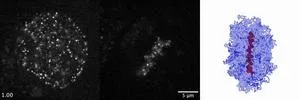Spike mutations help SARS-CoV-2 infect the brain
‘This could help us understand neurological symptoms of COVID-19’
2024-08-23
(Press-News.org) Still unknown what causes neurological complications of COVID-19 including ‘long COVID,’ ‘brain fog’ and loss of taste and smell
Viruses with a deletion in the spike protein are better able to infect the brains of mice
‘These findings suggest there might be treatments that could work better to clear the virus from the brain’
CHICAGO --- Scientists have discovered a mutation in SARS-CoV-2, the virus that causes COVID-19, that plays a key role in its ability to infect the central nervous system. The findings may help scientists understand its neurological symptoms and the mystery of “long COVID,” and they could one day even lead to specific treatments to protect and clear the virus from the brain.
The new collaborative study between scientists at Northwestern University and the University of Illinois-Chicago uncovered a series of mutations in the SARS-CoV-2 spike protein (the outer part of the virus that helps it penetrate cells) that enhanced the virus’ ability to infect the brains of mice.
“Looking at the genomes of viruses found in the brain compared to the lung, we found that viruses with a specific deletion in spike were much better at infecting the brains of these animals,” said co-corresponding author Judd Hultquist, assistant professor of medicine (infectious diseases) and microbiology-immunology at Northwestern University Feinberg School of Medicine. “This was completely unexpected, but very exciting.”
The study will be published Aug. 23 in Nature Microbiology.
Changes in spike help the virus infect different cells in the body
In this study, researchers infected mice with SARS-CoV-2 and sequenced the genomes of viruses that replicated in the brain versus the lung. In the lung, the spike protein looked very similar to the virus used to infect the mice. In the brain, however, most viruses had a deletion or mutation in a critical region of spike that dictates how it enters a cell. When viruses with this deletion were used to directly infect the brains of mice, it was largely repaired when it traveled to the lungs.
“In order for the virus to traffic from the lung to the brain, it required changes in the spike protein that are already known to dictate how the virus gets into different types of cells,” Hultquist said. “We think this region of spike is a critical regulator of whether or not the virus gets into the brain, and it could have large implications for the treatment and management of neurological symptoms reported by COVID-19 patients.”
SARS-CoV-2 has long been associated with various neurological symptoms, such as the loss of smell and taste, “brain fog” and “long COVID.”
“It’s still not known if long COVID is caused by direct infection of cells in the brain or due to some adverse immune response that persists beyond the infection,” Hultquist said. “If it is caused by infection of cells in the central nervous system, our study suggests there may be specific treatments that could work better than others in clearing the virus from this compartment.”
Other Northwestern authors on the study include Lacy M. Simons, Tanushree Dangi, Egon A. Ozer, Pablo Penaloza-MacMaster and Ramon Lorenzo-Redondo.
Funding for this study, “Evolution of SARS-CoV-2 in the murine central nervous system drives viral diversification,” was provided by the National Institutes of Health (grants R01AI150672; R56DE033249; R21AI163912 and U19AI135964); the Department of Defense (grant MS200290); and through institutional support for the Center for Pathogen Genomics and Microbial Evolution and the Northwestern University Clinical & Translational Sciences Institute (NUCATS).
END
[Attachments] See images for this press release:


ELSE PRESS RELEASES FROM THIS DATE:
2024-08-23
A variety of vegetarian diets appear to protect against risk of mortality and contributing conditions, with a pesco-vegetarian diet — which includes fish — providing the most protection against risk in very elderly people, according to a new study.
Researchers at Loma Linda University Health found that vegetarian diets are associated with lower risk for all-cause mortality and many cause-specific mortalities, especially among males and in middle-aged subjects. However, slightly higher risks were observed among very elderly vegetarians for neurological conditions such as stroke, dementia, and Parkinson’s Disease. Despite this, ...
2024-08-23
Cervical cancer, the fourth most common cancer type in women, causes approximately 350,000 deaths each year, mainly in middle- and low-income countries. Human papillomavirus (HPV) infection is known to cause 95% of these cases. Public health authorities in 37 countries currently vaccinate girls between nine and 14 years of age, before they typically start sexual activity.
HPV is also known to increase the risk of genital warts and cancers of the penis, anus, mouth, and throat in infected men, which is one of the reasons why the WHO and the US Center for Disease Control (CDC) ...
2024-08-23
Human wellbeing is connected to nature for food, climate regulation and culture, making the protection of nature a human rights matter.
Added to that, recent developments in international human rights law highlight that governments need to consider human-nature connections when making decisions that may affect the environment.
In a commentary published in npj Ocean Sustainability, an interdisciplinary group of researchers – including experts in ecosystem services, environmental governance, deep-sea ecology, and law – underscore that these developments should prompt a rethink of how any environmental decisions that hold the potential to impact biodiversity ...
2024-08-23
Hybrid perovskites have great potential for use in advanced electronic devices like solar cells and LEDs. However, one major issue holding them back is that they don't last as long as needed for widespread commercial use. As these materials age, their performance drops, which is a big problem for both researchers and companies. To tackle this issue, it's important not only to improve the stability of these perovskites but also to develop methods for detecting how they age in real-time. By understanding how these materials degrade over time, we can make them more durable and efficient.
In a recent study, researchers led by Prof. Yiwen Sun at Shenzhen University used the terahertz ...
2024-08-23
Primate ornamentation plays a crucial role in communication not only within social groups but also between them, according to a new study. The research reveals that the males of species with overlapping home ranges often display vibrant colors or elaborate features, traits that may help reduce intergroup aggression by enabling quick assessments of potential rivals.
Ornaments are sexually selected traits that serve as powerful signals, often indicating an individual’s genetic quality, health or physical strength. These differences ...
2024-08-23
AUGUST 2024 TIP SHEET: A mouthwash-like rinse to predict head and neck cancer recurrence, new research identifies biomarkers to predict which colon cancer patients benefit from adjuvant chemotherapy, the Dolphins Cancer Challenge and StacheStrong team up to boost brain cancer research, the CDC issues anal cancer screening guidelines for HIV patients based partly on research at Sylvester, and three Sylvester physicians who become the latest early-career faculty scholars are highlighted in this month’s tip sheet from Sylvester Comprehensive ...
2024-08-23
The anti-obesity medication semaglutide may help to prevent heart attacks and other major adverse cardiac events among overweight people who have cardiovascular disease, whether or not they also have heart failure, according to a new study led by UCL’s Professor John Deanfield.
The results follow previous research* from the same international team finding that weekly injections of semaglutide were linked to a 20% reduction in major adverse cardiac events (MACE) such as heart attacks and strokes for people with obesity or who were overweight and had cardiovascular disease.
The ...
2024-08-23
Most people — up to 94% of U.S. adults — experience at least some dulling of their senses with age, finding themselves squinting at screens, craving stronger flavors, and missing snatches of conversations more and more frequently. Researchers at the University of Chicago Medicine are looking into how these changes can go beyond mere inconvenience and actually worsen overall mental health in older adults.
“When your senses decline, you can't experience the world as well,” said Jayant Pinto, MD, a physician ...
2024-08-23
Scientists and engineers are ready to fly an infrared mission called EXCITE (EXoplanet Climate Infrared TElescope) to the edge of space.
EXCITE is designed to study atmospheres around exoplanets, or worlds beyond our solar system, during circumpolar long-duration scientific balloon flights. But first, it must complete a test flight during NASA’s fall 2024 scientific ballooning campaign from Fort Sumner, New Mexico.
“EXCITE can give us a three-dimensional picture of a planet’s atmosphere and temperature by collecting data the whole time the world orbits its star,” said Peter Nagler, the mission’s principal ...
2024-08-23
As climate change creates hotter, drier conditions, we are seeing longer fire seasons with larger, more frequent wildfires. In recent years, catastrophic wildfires have destroyed homes and infrastructure, caused devastating losses in lives and livelihoods of people living in affected areas, and damaged wildland resources and the economy. We need new solutions to fight wildfires and protect areas from damage.
Researchers at Stanford have developed a water-enhancing gel that could be sprayed on homes and critical infrastructure to help keep them from burning during wildfires. The research, published Aug. ...
LAST 30 PRESS RELEASES:
[Press-News.org] Spike mutations help SARS-CoV-2 infect the brain
‘This could help us understand neurological symptoms of COVID-19’





